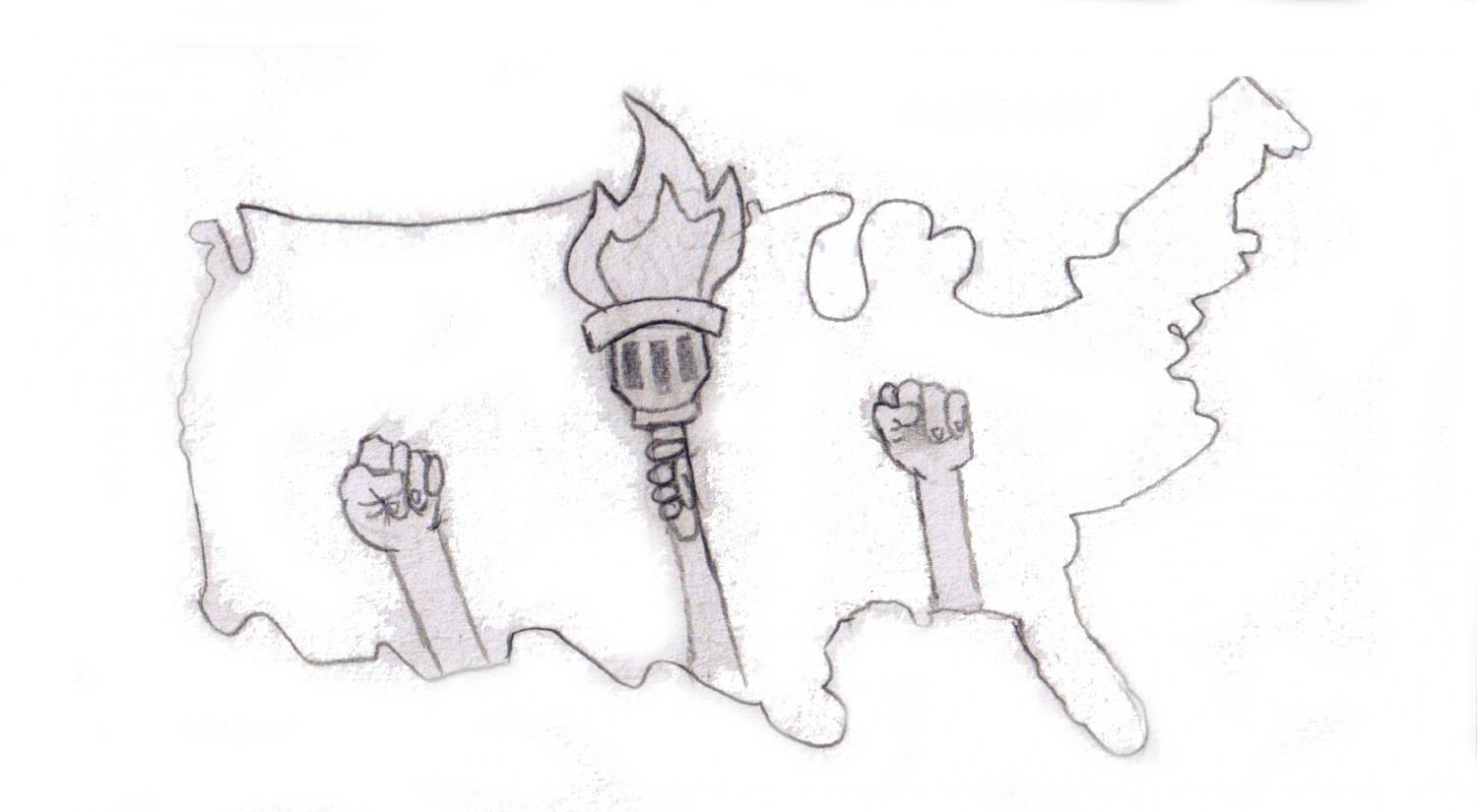Commentary: Immigration debate hits home
May 19, 2017
When legal immigrants aren’t assimilating, when skilled and productive illegal aliens aren’t given a path to citizenship, when the achievement of fullest potential by unaccompanied minors isn’t being prioritized, the United States’ immigration policy is evidently failing.
Governmental approaches towards immigration, especially concerning illegal immigration, have been debated for decades. This has been reflected on the different state-adopted policies dealing with the immigrant overflow of the past years, as it has always seemed to act in ignorant and/or contradictory terms.
Conservatives, who have historically looked down on immigrants in a condescending, nativist way, are very influential, but the public opinion has been gradually changing in today’s mass-media world. Even though Republican Donald Trump won the Electoral College, the popular vote showcased the evolution of American ideals from conservative to liberal. Those who voted for Democrat Hillary Clinton, for example, were in favor of a reform that will provide a pathway to citizenship to illegal aliens.
As an immigrant myself, I have noticed that many Americans have limited knowledge about what it can mean to be ‘legal’ or ‘illegal’. Many assume that being ‘illegal’ means having crossed the border illegally through the Rio Grande or the desert with the help of polleros. However, many illegal aliens are considered illegal not because they don’t have a visa, but because they stay and study or work in the U.S with a visa that does not correspond to their activities in U.S territory, such as a tourist visa. ‘Legal immigrant’ is also a term that defines an array of individuals: legal aliens could have a government-provided card, a work visa, a student visa, or a residency. There are also illegal immigrants who, unlike many legal immigrants, have a social security number that allows them to work. These immigrants are in the DACA program, Obama’s controversial, and some may even argue unconstitutional, executive order.
Why is there such a vast divide in opinion? Perhaps it is due to the widely different beliefs of the two major political parties, which may not accurately represent the public’s opinion. Republicans are said to traditionally rate immigrants, especially illegal immigrants, as ‘unwanted’, while Democrats view the topic in a more optimistic, immigrant-friendly way.
This divide, however, is probably not as extreme in the public. Most voters would change and keep different parts of the current policy, rather than radically reforming it all. This is because it’s more complex than believing immigrants are beneficial or detrimental to the country – they believe that some immigrants are advantageous to society, and that others bring nothing but trouble to the U.S. Some believe that there is no excuse for immigrants to cross the border illegally, while others argue that their countries’ desperate situations justify their actions.
To me, it comes down to an individual’s intentions, and how the government promotes their enrichment not only as people, but as new assimilating Americans. At the end of the day, unlike conservatives like to believe, most immigrants aren’t hiding from their criminal past and paying no taxes, they’re legally pursuing an ‘American Dream’ that usually has citizenship as a last step. After all, a person’s hometown doesn’t determine their destiny, or their character. That’s the freedom the ‘American spirit’ is supposed to provide, the freedom immigrants thought they’d get in the U.S.
We have all seen the pictures: women are seen cherishing the moment they reunite with their families at Border Field State Park, people on top of the train La Bestia–the Beast– that takes immigrants through Mexico. To some, these photos reflect how families are split because of the slow, tedious immigration processes. To me, it’s even more than that: it shows how people are willing to become illegal immigrants and fight for the future of her children.
One must wonder what situation forced them to leave their families, and how they were convinced to take such a difficult decision. The fact that they are willing to cross illegally also demonstrates their determination, and courage. Maybe it was wrong to cross illegally, but wouldn’t it have been wrong to let their homeland’s struggles define their family’s chances of advancement?
Some Americans argue that securing the border should be the main priority, but, to me, the root of high immigration is not the result of an unguarded fence. The Huffington Post, for example, went as far as to say the border has never been so controlled. Rather than asking themselves why the border patrol, known to immigrants as la migra, isn’t effective, Americans should be asking why people are pushed to come in the first place. It’s not easy to cross the border. Many people die slowly under the ruthless desert sun, and yet millions try. Why they try, rather than the fact that they’re trying, should be the focus.
The main cause of increasing illegal immigration is not decreasing security near the border, but the increasing struggles of Latin American nations that encourage millions to take an immense risk – an often torturing, arduous, risk – that to them, is worth it at the end. Even if Trump’s wall gets built, illegal immigration will continue to be an issue until fewer immigrants are forced to look elsewhere for a decent life.
In the Washington Times, the positive impact of immigrants in the economy has been reported through examples and statistics. Immigrants do not ‘take American jobs’. Rather, they are twice more likely to establish businesses that provide new jobs to citizens. This fact also reflects how, for the most part, immigrants, legal and illegal, do not mainly come to invade or take advantage of America – they come willing to innovate and work to achieve a life that might’ve been impossible to live in their home countries.
Furthermore, there is a much deeper question to find the answer to: What does it mean to be American? According to the law, it’s having been born in the U.S or having American parents.
Really, the question of who we are is much more complex. For example, I am a legal immigrant. I never had an ‘American Dream’ until I moved, and I don’t feel American. So, until I do, I’m going to stay a legal immigrant, no matter what the advantages of acquiring citizenship are, thank you very much. Being American is simply not a part of my identity, at least not for now.
For many illegal immigrants it’s exactly the opposite: they actually feel American. They have adapted. They do speak English. It may be their second language, but many of them speak it just as well as they speak their first language, or even better. They live as Americans. They pay taxes and they contribute to the United States of America. They were raised in America And yet they don’t get to call themselves Americans.
Immigrants are a minority, but they are a prevalent one that, against the odds, has always driven history right beside born-in-the-U.S Americans. They do it because their intentions go in line with American ideals, which they adopt not merely out of necessity, but out of the desire to improve a land that hasn’t always welcomed them with open arms, the same land they call home, and the one that wants their blooming seeds rooted out and blown away to a land where darkness reigns.












